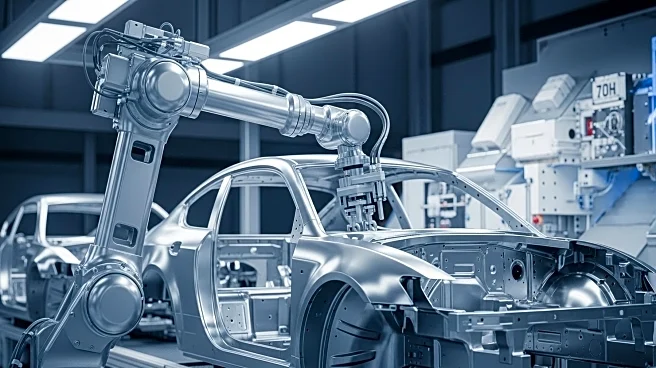What is the story about?
What's Happening?
President Trump is contemplating significant tariff relief for U.S. auto production, potentially reducing costs for major car companies. Republican Senator Bernie Moreno and auto officials have indicated that this move could effectively eliminate tariffs for companies with final assembly operations in the U.S., such as Ford, Toyota, Honda, Tesla, and GM. This initiative aligns with Trump's policy to incentivize domestic manufacturing and job creation. The Commerce Department has proposed an import adjustment offset of 3.75% of the suggested retail price for eligible U.S.-assembled vehicles, which may be extended to five years and expanded to include U.S. engine production. Automakers' shares have risen following the news, reflecting optimism about potential tariff relief.
Why It's Important?
The potential tariff relief is significant for the U.S. auto industry, as it could lower production costs and encourage companies to increase domestic manufacturing. This aligns with President Trump's broader economic strategy to boost American jobs and reduce reliance on imports. Automakers with substantial U.S. production stand to benefit, potentially leading to increased investment in American facilities and workforce. The move could also impact international trade relations, as it may alter the competitive landscape for foreign manufacturers. The relief could bolster the U.S. economy by enhancing the auto sector's contribution to GDP and employment.
What's Next?
A final decision from President Trump is anticipated soon, which could formalize the tariff relief measures. If implemented, automakers may adjust their production strategies to maximize benefits from the tariff breaks. The White House has stated its commitment to securing domestic auto production, but until official action is taken, discussions remain speculative. Stakeholders, including auto companies and trade partners, will be closely monitoring developments. The policy could prompt reactions from international trade partners, potentially influencing future negotiations and agreements.
Beyond the Headlines
The proposed tariff relief raises questions about the long-term implications for global trade dynamics and the U.S. auto industry's competitiveness. Ethical considerations include the impact on international labor markets and environmental standards, as increased domestic production may shift resource allocation. The policy could also influence cultural perceptions of American manufacturing and consumer preferences, potentially driving demand for U.S.-made vehicles.
















